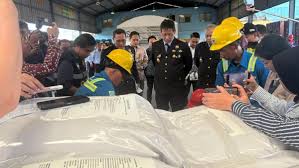
The national textile and textile product (TPT) industry is once again in a state of emergency. The Indonesian Filament Fiber and Yarn Producers Association (APSyFI) has officially sent a letter to the Minister of Finance, Purbaya Yudhi Sadewa, requesting an audience to discuss measures to rescue the sector from the onslaught of illegal imports and dumping of Chinese products.
APSyFI Chairman Redma Gita Wirawasta emphasized that the Indonesian textile industry is "bleeding." In the past two years, at least 60 companies have closed and thousands of workers have been laid off due to their inability to compete with the flood of cheap imported products, allegedly imported illegally.
"The TPT industry is integrated from upstream to downstream. However, now the supply chain is broken due to illegal imports and dumping of products from China," Redma said in the letter, quoted on Monday (10/13/2025). He added that the Minister of Finance's commitment to eradicating illegal imports offers new hope for the industry, which has long been a mainstay of national exports and employment.
In the letter, APSyFI also proposed several concrete proposals to improve the governance of textile and textile imports and strengthen field supervision.
First, APSyFI requested that the Directorate General of Customs and Excise implement an electronic data interchange (EDI) system with a master bill of lading (B/L) as the primary document for the import notification (PIB). According to Redma, the current system is not based on the master B/L, thus opening up opportunities for unscrupulous importers to commit misdeclarations, such as under-invoicing and HS code evasion, allowing their goods to pass through the green lane without physical inspection.
Second, APSyFI urged that all containers be inspected using AI scanner technology. If discrepancies between the contents and the documents are found, they must be transferred to the red lane for physical inspection. Furthermore, it proposed that imports of finished goods be carried out only at certain ports with complete scanning facilities.
Third, the association requested that import facilities for export purposes be limited to companies in Bonded Zones (KB) and Export-Destination Import Facility (KITE), along with improvements to the oversight system. They also urged the abolition of Bonded Logistics Center (PLB), Bonded Warehouse (GB), and MITA facilities due to their frequent misuse.
Fourth, APSyFI believes that there is a need to revise the regulations on goods carried and shipped, which have often been used as alternative routes for smuggling cheap textile products.
Fifth, the association demands a ban on bulk or cubic-based imports, as well as a thorough investigation of all parties involved in illegal import practices, including those protecting these activities.
"Weak law enforcement has created an import mafia network involving unscrupulous importers, logistics services, customs officers, and even certain officials protected by law enforcement," said Redma.
Through this letter, APSyFI hopes to meet directly with the Minister of Finance and the Indonesian Textile Association (API) to explain the real conditions of the national textile and textile industry, as well as the multiplier effects that will arise if trade remedies policies are implemented firmly.
Swift and comprehensive rescue measures are considered crucial to prevent the Indonesian textile industry from further deterioration. Because, amidst fierce global competition, the textile and textile industry is not only about the economy, but also about the sustainability of millions of workers and the existence of national manufacturing.
